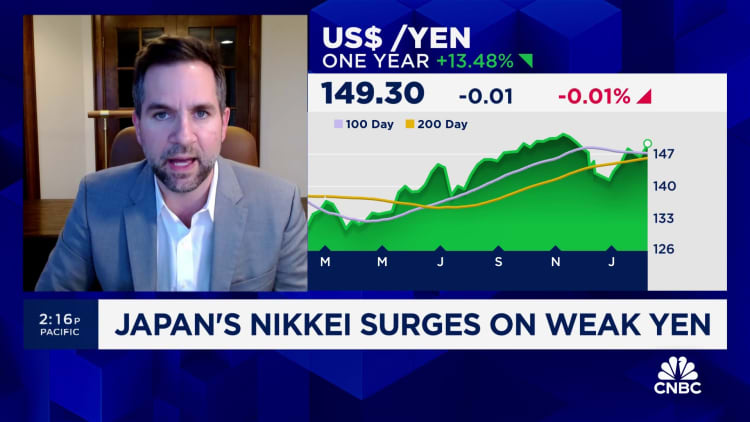Pedestrians walking across with crowded traffic at Shibuya crossing square.
Jaczhou | E+ | Getty Images
Japan’s Nikkei 225 hit a record high on Thursday as robust corporate profitability and steps aimed at boosting investor returns fuel a blistering rally in Japanese equities this year.
The Nikkei 225 hit 38,924.88, surpassing the previous record high of 38,915.87 reached in 1989.
Both the Nikkei and the broader Topix have been standout outperformers in the Asia Pacific, up more than 10% so far this year 2024 after surging more than 25% in 2023 â their respective best annual gains in at least a decade.
Japan Inc’s solid third-quarter corporate earnings have prompted Bank of America equity strategists to upgrade their 2024 year-end forecasts for the Nikkei 225 to 41,000 from 38,500. They raised their forecasts for the Topix to 2,850 from 2,715.
The rally has also been supported by a weaker yen, which has shed about 6% against the dollar so far this year and seems on track to drop to to 33-year lows touched late last year.

Nikkei since December 1989
Investors have been pouring funds into Japanese equities, taking the lead of Warren Buffet’s bullish calls on Japan and cheering the Japanese government’s push towards greater corporate governance reforms â with the aim of compelling Japan Inc to boost shareholder returns.
Data from the Tokyo Stock Exchange showed foreigners invested more than 2 trillion yen in the exchange’s “prime” offerings â its largest and most liquid stocks â in January.

Nikkei reported last week net profits of listed companies in Japan for the fiscal year ending March 2024 could reach a record high for the third consecutive year.
This comes on the back of record quarterly earnings for the October-December period, which have increased 45% from the same period a year earlier and are 14% higher than consensus estimates, according to Goldman Sachs analysts.
Toyota, the world’s largest car manufacturer, was among several Japanese companies to upgrade its earnings forecast, which includes a bigger profit margin and stronger revenue.
Weak yen, strong stocks
Recent gains in the stock markets have come against the backdrop of a weakening Japanese yen, last at 150.40 against the dollar, driven largely by the divergence between between high U.S. interest rates and Japan’s ultra easy policy.
Japanese Finance Minister Shunichi Suzuki was the latest in a string of several government officials to articulate his concern on the weakening yen on Friday and reportedly said he was watching the currency’s moves with a sense of “urgency.”

Japanese yen/U.S. dollar
While the yen’s chronic weakness has boosted some of Japan’s exporters, it has diminished the purchasing power of consumers in Japan.
Yet the Bank of Japan has maintained the world’s last negative rates regime despite “core core inflation” â which excludes food and energy prices â exceeding its 2% target for more than a year.
Market participants expect the BOJ to move away from its negative rates regime at its April policy meeting, once the annual spring wage negotiations confirm a trend of meaningful wage increases.

The central bank believes wage increments would translate into a more meaningful spiral, encouraging consumers to spend.
But prolonged high inflation rates have hit domestic consumption â a key reason why Japan’s GDP shrank for a second consecutive quarter, confounding analysts that had expected a small expansion in Japan’s economy. It also meant that Japan ceded its place as the world’s third-largest economy to Germany.







